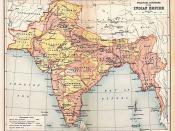COLINIZATION IN ASIA
Between the fifteenth and eighteenth centuries, European nations flourished. They gained control over a majority of the Western Hemisphere. From 1880 and 1914, Western powers set out to gain power in places such as Asia, Africa, and the Pacific, Asia becoming the location of their major colonies and a gold mine of economic gain. Through trade, military power and the exploitation of the local peoples many European nations gained control of south and East Asia for colonization. While these European colonizers brought some benefits to Asians, they were on the whole destructive as they had an overall negative effect on the local economies, the people and their cultural identities, and on Asian politics. This will be shown by using England and it's colonization of India and China as an example.
The major reason Europe partook in the colonization of Asian countries such as India and China was trade with the local people and the use of the countries manual labor for manufacturing and agriculture.
The consequences of this though, were the ruin and corruption of local economies. Europe's interest in local economies did not have only negative effects. In China the merchant class who had been looked down upon played an important role in society, in fact during British rule the richest man in the world was Chinese. In India, the construction of railway systems, proper roads and postal agencies encouraged easier trade between communities. These benefits, however, were greatly outweighed by the negative economic impacts. A Britain's power grew over India they took advantage of it and imposed high taxes on British imports and discouraged Indian exports. In the early 1800's a majority of the cotton crops, for example, was produced in India, processed in Britain and sold back to India. With more money going out...


